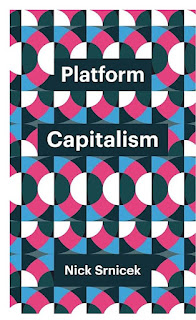What is platform capitalism? Summary, definition and examples from Srnicek
 Capitalism tends to be restructured and improved in new ways for capital accumulation. Platform capitalism is one form of this reform that started with the explosion of internet-based companies in the 90s. The rise of technology provides the possibility to carry out automation. It is proclaimed as a new era under various names, from the 'paradigm shift' and '4th industrial revolution', to align this change with the age of enlightenment 'Renaissance', which is ridiculous.
Capitalism tends to be restructured and improved in new ways for capital accumulation. Platform capitalism is one form of this reform that started with the explosion of internet-based companies in the 90s. The rise of technology provides the possibility to carry out automation. It is proclaimed as a new era under various names, from the 'paradigm shift' and '4th industrial revolution', to align this change with the age of enlightenment 'Renaissance', which is ridiculous.
Advances in communication technology allow humans to concentrate an unlimited amount of information. This method is considered a form of democratisation of information and knowledge. However, it does not mean that public is the collective owner of the information. Although it seems we are in an area that allows us to access a wide range of information and get ahead with it. What is often forgotten is access is still under the terms of conditions of ownership of capitalism and an invisible trade-off between the user and the platform owner.
When accessing a platform, users enjoy the service and submit data. Data is raw material, that finally, is taken by the platform owner. The platform processes data into value. In this case, we must distinguish data from knowledge. Data is information about something that happened. Knowledge is about why something happened. Data needs to be processed and analysed first to be knowledge.
Another myth is that data is considered immaterial. In contrast, energy consumption in data centres is responsible for 9.2% of the world's electricity consumption. Data must also be cleaned and organised into a standardised format, which today involves enormous workers who work manually.
So, a platform provides services to users and collects data by recording information from users who rely on a solid infrastructure. Data is like oil that must be defined and used for various purposes. Data was initially a peripheral aspect of a business; now, it is increasingly becoming a central resource in the form of platforms.
What are platforms?
A platform is a digital infrastructure that allows two or more individuals or groups to interact. The platform is in the position of connecting between users and being where activities take place while it is recorded.
For example, intimate social interactions on Facebook can be recorded by Facebook. It can be used as raw material to be processed into knowledge. Facebook can use them for the benefit of Facebook.
The second important characteristic of digital platforms is that they rely on 'network effects'. The more users are on a specific platform; the more valuable the platform is to others. For example, someone will be more likely to choose a platform to socialise if they find most of their friends and family already there. That is, the platform has a natural character to lead to monopolisation. Many platform businesses rely on pre-existing infrastructure and low marginal costs, which means there are few natural limits to growth. It allows the platform to continue to grow and expand.
Taking the 'network effect' into account, platforms have to run many tactics to ensure that more and more users come and keep are on board. That is why many platforms provide free services in the framework of cross-subsidisation. For example, Google provides free services for email and various other features but makes money by activating advertising through Google AdSense.
Eventually, platforms will be able to influence in politics because of their position as intermediaries. Platforms get exclusive access to more of what and can also control and govern the game's rules.
Platform is a new type of enterprise that provides the infrastructure to mediate between different users with monopoly tendency, implementing cross-subsidisation and managing interactions as much as possible.
Here are the different types of platforms:
1. An advertising platform that extracts information about users and their activities, then sells advertising space on the internet. Examples: Google, Facebook.
2. Cloud platform that has hardware and software to support digital business and rent them out as needed. Examples: AWS, Salesforce.
3. An industrial platform that builds the hardware and software needed to transform traditional manufacturing into internet-connected manufacturing to lower production costs and turn goods into services. Example: GE, Siemens.
4. Product platforms that generate revenue by using other platforms to convert traditional goods into services by collecting rent or subscription fees. Example: Rolls Royce, Spotify.
5. Lean platform seeks to reduce asset ownership to a minimum and generate profits by reducing costs as little as possible. Example: Uber, Airbnb.
The same company may use the combination of some types of platforms, for example, Amazon, which is often seen as an e-commerce company but quickly expanded into a logistics company. Amazon also provides movie subscriptions, website hosting and more.
Conclusion
A platform not only provides services but also performs massive data appropriation (in the name of better service and the consent of users). Then the extracted data is analysed, used and sold. Capitalism has grown from Ford's mass production to Toyota's lean production 'just-in-time'. It is now and again evolving into mass customization in production.
All this is made possible by the latest technological developments in capitalism, which strives to reproduce at the lowest possible cost and get the most significant profit. The platform becomes the central model for extracting data from humans as raw material that can be used in various ways. The platform is the ideal extractive apparatus.
The emergence of platforms is considered a new era where people live in the age of information. However, it should be noted that manual work is still essential. For instance, content moderation for Google and Facebook in the Philippines is done by 100,000 workers. They perform content moderation which are often disturbing mentally since they should see horror, violence and bloody content.
These companies are simply continuing the trend of outsourcing low-skilled workers and keeping high-skill, high-paying jobs at the core of their activities. They benefit from a population surplus that supplies more low-skilled workers at lower wages.
The saturated surplus-value is invested in countries with low-interest rates and taxes. It allows companies to avoid high taxes and increase profits in countries with easy monetary policies.
The myth that the platform puts an end to private ownership is not valid. The platform's presence is not the end of the age of ownership but instead increases the concentration of ownership. An 'age of access' is empty rhetoric that obscures reality.
***
Read more in: Platform Capitalism, Nick Srnicek.


Comments
Post a Comment
Thanks for your polite comments